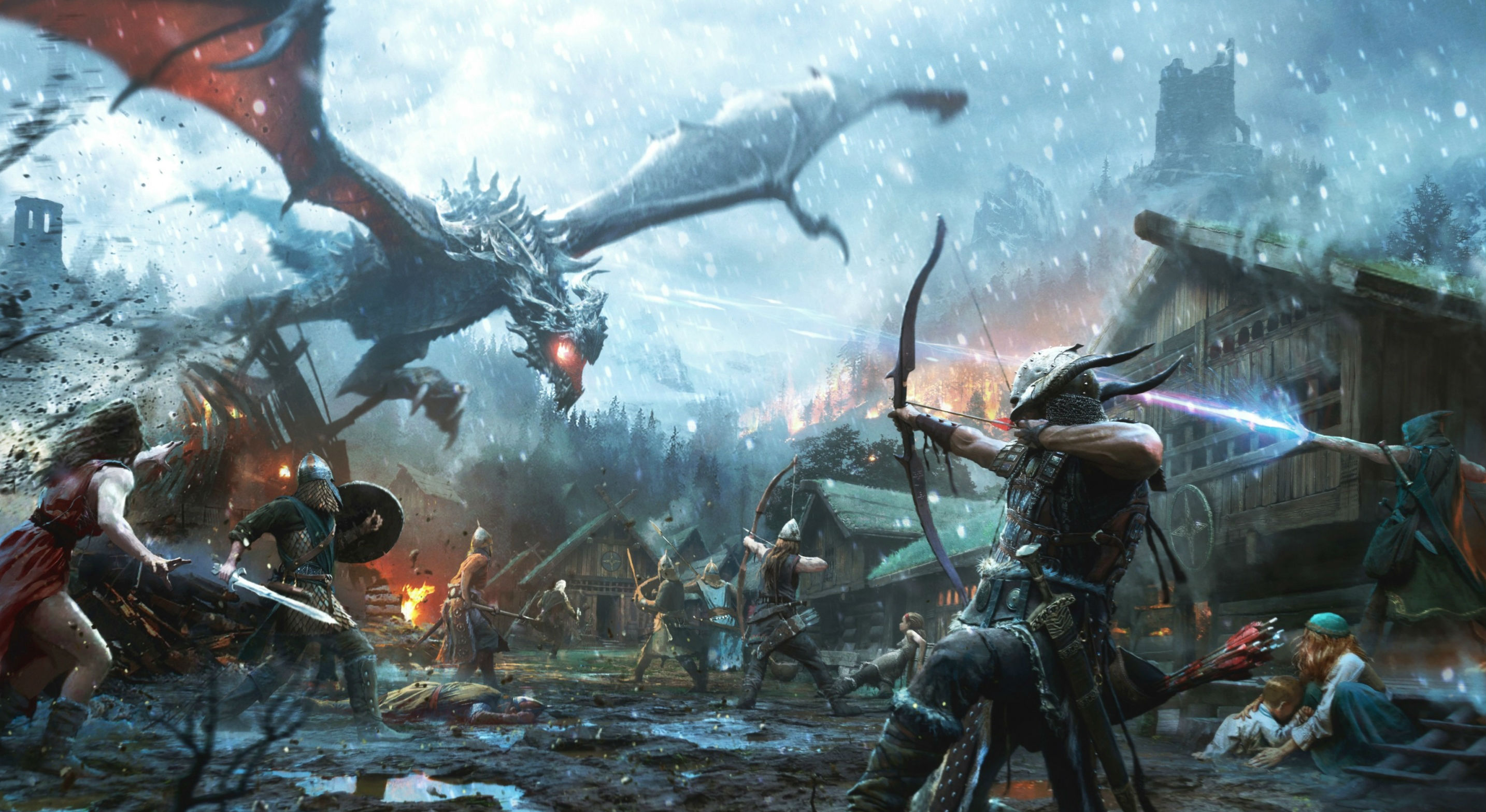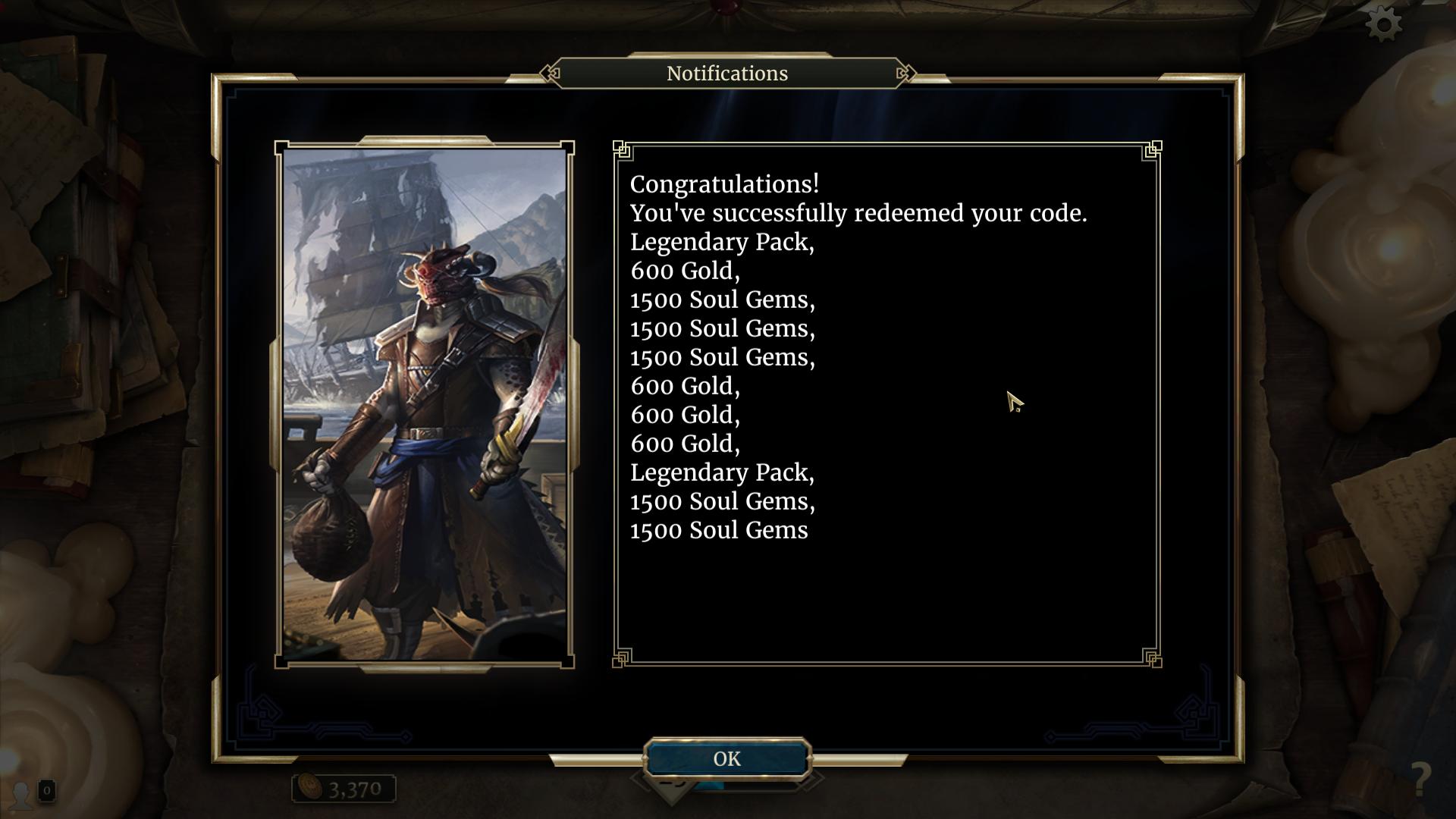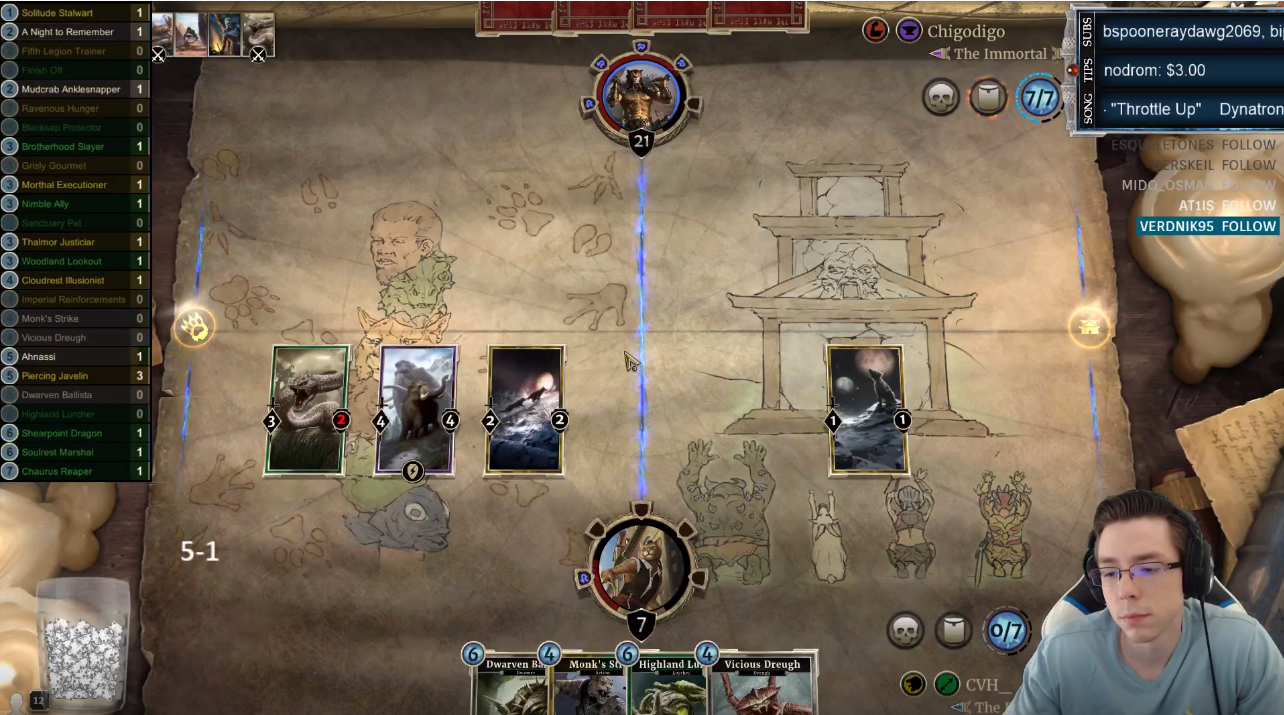
The promise of playing big-ass dragons and magical shouts has lured me back to The Elder Scrolls: Legends this month. The new Heroes of Skyrim expansion contains over 150 cards, including unique legendaries for lore favourites like Alduin, Ulfric Stormcloak and J'zargo (pro tip: do not craft the hapless Khajit wizard). I’ll be writing something approximating a review next week, but right now I want to talk about the in-game economy, because Legends is doing something pretty remarkable that's going to have an effect on lots of games in the future.
As with all CCGs, building a competitive collection can be a dauntingly expensive business, even though Legends has always been pretty generous about handing out gold rewards for buying packs and the soul gems used to make cards. With the userbase feeling somewhat fragile before the new set launched, I wondered how many players would be willing to spend big on packs, especially given that the game’s 50-card decks can run up to three copies of certain legendaries.
Bethesda and developer Dire Wolf Digital came up with a few solutions to the cost problem, including selling decent pre-built decks containing some of the new cards for 500 gold a pop. But the most interesting idea has been the introduction of Twitch drops. The way these work is simple: Link your Bethesda account to your Twitch one, then watch any streamer in The Elder Scrolls: Legends directory (doesn’t matter how big the channel is), and eventually you’ll be notified with a private message to say that you’ve been selected to receive a random reward which will then be credited to your in-game account.
Currently the rewards on offer are 600 gold (enough to buy six packs), 1500 soul gems (enough to craft a legendary card), or a legendary pack that contains a single random legendary card.
But here’s the nuts part: Provided you’re logged in pretty regularly—and there’s nothing to stop you going AFK while the stream is running—you can realistically expect to get one of these drops every 24-36 hours. Bethesda won’t reveal what the exact cooldown is, but did confirm to me that watching multiple streams at once makes no material difference to your chances.
Obviously I benefit from having a job at which it’s acceptable to leave Twitch running on my second monitor for half the day, but I can confirm that since the drops scheme has been running I’ve received enough gold to buy dozens of packs, multiple legendaries, and the gems to craft plenty more. Combined with the fact that Skyrim’s initial log-in reward quest, which gave players three packs for winning three games, was bugged and kept repeating, I’ve been able to build an almost complete Skyrim set relatively quickly and cheaply, with only one 50-pack bundle paid for with cash.

Clearly flooding the market with gold and gems around the time of a new release is a good way to energise the playerbase, but I’m surprised at how generous Bethesda has been here. Less surprisingly, Pete Hines, vice president of PR and marketing at Bethesda, suggested that drop rates will change in the future on last week’s The Elder Scrolls: Legends stream, and presumably that doesn’t mean they’ll be going up. "We’re going to play with it and try a variety of things of different shapes and sizes," a Bethesda spokesperson told me. "The system gives us the flexibility to dial up or down the frequency of drops as needed. We’ll always strive to do what’s best for the community and the long-term health of the game."
Keep up to date with the most important stories and the best deals, as picked by the PC Gamer team.
The idea of free stuff in exchange for spectating is of course not new to PC gaming, with CS:GO pioneering Souvenir Packages as far back as 2014. “We’d seen a few other games do it,” Bethesda’s rep tells me. “AJ (LaSaracina, brand manager on Legends) is the one who came up with the idea and we kinda ran with it.” What's interesting about the way Legends is handling drops is that the rewards aren’t tied to a one-off event or tournament, but are instead intended as ongoing support for content creators.
A dream for streamers
Since the system came into play, Legends' most popular streamers have seen their viewership jump dramatically. “Drops have, in short, been incredible," says Christian "CVH" Van Hoose, who runs one of Legends’ biggest channels. "Before Twitch drops, I averaged between 150-200 viewers and peaked at 300 or so thanks to the recent Steam release, which was another good move. The day after drops my viewership more than doubled, and has been on the rise even since then. As I'm writing this, my average concurrent viewership has been over a thousand for the past week, which is a number I had never even peaked remotely close to prior."
Van Hoose isn’t worried that the rewards are likely about to be dialed down either. "I wouldn't mind if they had to lower the value of them as long as they could keep their frequency and encourage streamers and viewers to check out the game on Twitch. I'm not sure if that would ever become necessary, but I'd be happy with reduced Gold, a single card pack, or other rewards as well."

I’m curious about whether these new viewers still engage with the channel in the way his regulars do, or whether the fixation with drops has led to a worse chat experience. “Overall chat activity is up," he says. "Granted, it hasn't seen a directly proportionate increase to the increased viewers, because of some leaving the stream on while doing other things, but it shows that many who come just for the "free stuff" wind up getting more engaged and start chatting. No one is required to follow the stream, subscribe, or even comment in chat to get the drops, yet I have seen a significant increase in all three areas."
Seemingly, then, it's a system without downsides. The players get free stuff that makes completing their collection significantly easier, the streamers get a substantial audience boost, and Dire Wolf and Bethesda get a game with a more viable playerbase (presumably at the acceptable cost of making slimmer margins on expansions). And even if you’re not a CCG fan, it’s easy to see how similar schemes could be applied to, well, any PC game that has in-game content. When Bethesda announced drops, they said the plan was to roll the idea out to other titles, though there’s nothing concrete the company is willing to talk about yet.
I also wanted to know if Twitch has similar programs in development with other publishers.
David Hoffman, senior manager for publisher & developer strategic partnerships tells me: “We are always evaluating new and interesting opportunities with our partners and hope to be announcing some additional drops partnerships soon.” Imagine getting weapon skins just for watching PUBG streams, to give one example off the top of my head, or Rocket League loot crates. It’s clearly in Twitch’s interest to make the process as seamless as possible. “Our drops integration process is fairly streamlined," says Hoffman, "and although it does take some work on the development side we have seen that the programs have paid off for the developers who have participated."
Hoffman also isn’t worried about an influx of grabby viewers who only care about freebies. "This was originally one of our concerns when we first decided to launch the program,” he says. "After monitoring the results closely so far we haven't seen this type of behavior. Folks who have tuned in, have not just tuned in for the reward, but have continued to engage even after receiving their loot. Additionally, the developer fully controls how they reward the viewers and are able to guard against exploiting the system as they see fit."
With integration in more games seemingly inevitable, the concept of Twitch drops in other games is clearly one to watch. After all, who knows what you might get?
With over two decades covering videogames, Tim has been there from the beginning. In his case, that meant playing Elite in 'co-op' on a BBC Micro (one player uses the movement keys, the other shoots) until his parents finally caved and bought an Amstrad CPC 6128. These days, when not steering the good ship PC Gamer, Tim spends his time complaining that all Priest mains in Hearthstone are degenerates and raiding in Destiny 2. He's almost certainly doing one of these right now.


